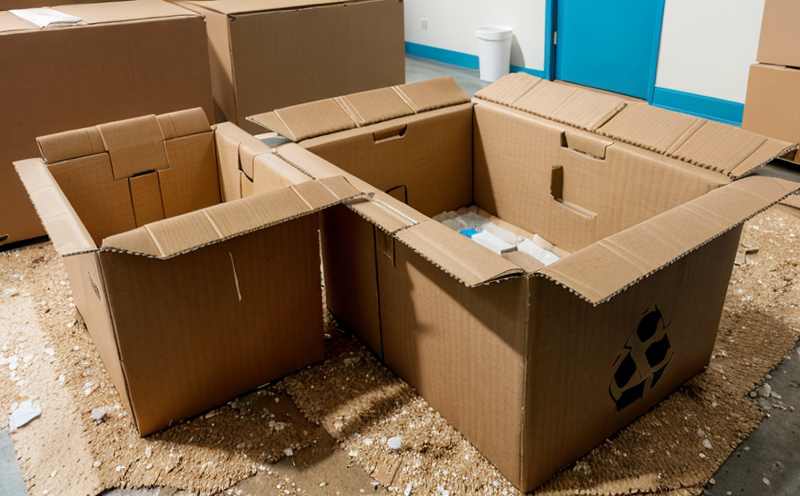ISO 535 Water Absorption of Recycled Paper (Cobb Test)
The ISO 535 Water Absorption of Recycled Paper, also known as the Cobb Test, is a critical method used in the quality control and certification process for recycled paper products. This test evaluates how quickly water penetrates the surface of recycled paper, providing essential insights into its moisture resistance.
The Cobb Test is widely recognized by industries such as packaging, printing, and publishing due to its relevance in ensuring product performance and compliance with international standards. By measuring the rate at which a specified volume of distilled water (typically 250 mL) penetrates a 1-meter square sample of paper within a set time frame (usually 30 seconds), this test helps identify any potential issues related to recycled content or treatment.
This procedure is particularly important for manufacturers who incorporate post-consumer waste into their products, as it ensures that the recycled fibers are not only environmentally friendly but also functional. For instance, if a manufacturer claims its product meets certain environmental standards like ISO 14025, they must demonstrate consistency in performance through rigorous testing such as this.
The Cobb Test is not just limited to raw materials; it can be applied throughout the entire manufacturing process—from pulping stages to final packaging. By integrating this test early on, companies can make informed decisions about their production processes and ensure that all steps contribute positively towards achieving desired outcomes while adhering to regulatory requirements.
For those involved in research and development (R&D), understanding how different types of recycled content behave under various conditions is crucial for innovation. The Cobb Test allows them to explore new combinations of virgin and recycled fibers, optimizing both sustainability and performance metrics without compromising on quality standards set by organizations like ISO or ASTM.
In summary, the ISO 535 Water Absorption test plays a vital role in maintaining consistency across production batches while promoting responsible use of resources. Its application extends beyond just manufacturing; it also supports environmental initiatives aimed at reducing waste and increasing recycling rates globally.
Benefits
The Cobb Test offers several key advantages to businesses operating within the waste management sector, particularly those involved in paper, pulp, and cardboard recycling. By providing accurate measurements of water absorption properties, it helps improve product quality, enhance customer satisfaction, and streamline supply chain operations.
- Enhanced Product Quality: Consistent results from the Cobb Test ensure that recycled papers meet specified performance criteria, thereby enhancing overall product quality.
- Improved Compliance: Regular testing against international standards like ISO 535 ensures compliance with regulatory requirements and supports environmental certifications.
- Increased Efficiency: With reliable data from the Cobb Test, manufacturers can optimize their processes, reducing waste and increasing efficiency in production.
- Customer Confidence: Meeting stringent quality benchmarks boosts customer trust and loyalty, fostering long-term relationships.
- Environmental Responsibility: By promoting responsible use of recycled materials, businesses demonstrate their commitment to sustainability, appealing to environmentally conscious consumers.
In addition to these direct benefits, the Cobb Test also contributes indirectly by encouraging innovation in recycling technologies and practices. As manufacturers strive for better performance metrics, they invest more resources into R&D efforts, leading to advancements that benefit everyone involved—from raw material suppliers to end users of recycled products.
Environmental and Sustainability Contributions
The Cobb Test plays a significant role in advancing sustainability within the waste management sector. By focusing on water absorption properties, this test directly addresses one of the key challenges faced by manufacturers using recycled paper products: ensuring that these materials remain functional despite being derived from previously used resources.
Recycled papers are often considered more sustainable because they reduce deforestation and lower energy consumption associated with manufacturing new wood pulp. However, incorporating too much post-consumer waste into a product can sometimes lead to compromised quality due to variations in fiber characteristics or potential contamination during the recycling process.
The Cobb Test provides a solution by offering precise data on how well recycled papers retain their integrity when exposed to moisture. This information is invaluable for manufacturers aiming to balance sustainability goals with practical considerations like shelf life and durability of finished products. For instance, companies can use this test to determine optimal levels of recycled content that still meet or exceed industry standards.
Furthermore, the results from the Cobb Test contribute significantly to broader environmental initiatives aimed at reducing waste streams and promoting circular economy principles. When industries adopt consistent testing methods like ISO 535 across their supply chains, it fosters collaboration between stakeholders who share common objectives of resource conservation and pollution prevention.
Use Cases and Application Examples
- Packaging Industry: Manufacturers producing corrugated cardboard boxes or other packaging materials made from recycled paper can use the Cobb Test to ensure that their products maintain adequate strength and integrity during transport.
- Publishing Sector: Newspapers printed on recycled paper need to be resistant enough so that ink doesn't smudge easily. This test helps publishers verify whether their chosen paper meets this requirement effectively.
- Paper Mills: Paper mills often experiment with different blends of virgin and recycled fibers. The Cobb Test allows them to assess the suitability of each blend based on its water absorption behavior, helping to formulate consistent products.
- Environmental Organizations: Non-profit groups working towards increasing recycling rates may employ this test as part of their educational campaigns, demonstrating why proper handling and processing of waste materials are essential for producing high-quality recycled paper.
Besides these specific applications, the Cobb Test serves as a benchmarking tool across multiple industries. It enables comparisons between various types of recycled papers, allowing manufacturers to select superior options based on tested performance data rather than subjective opinions alone.





